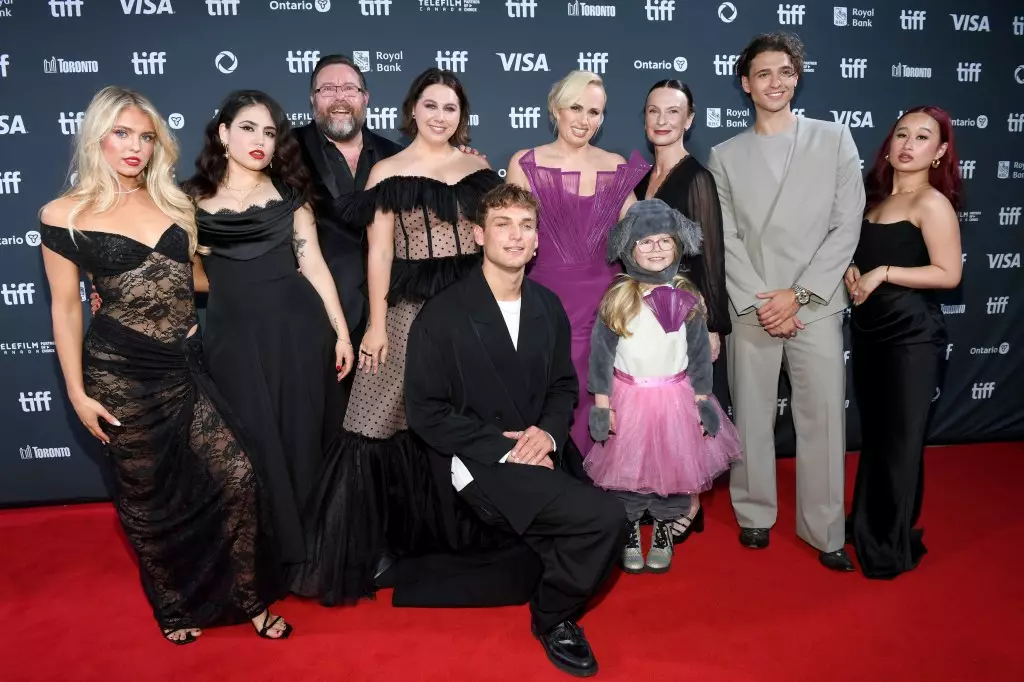In an ongoing saga that highlights troubling dynamics in the film industry, Rebel Wilson has officially retaliated against producers of her film, *The Deb*, by filing a counter-lawsuit. This counter-complaint emerges in the wake of significant tension that has unfolded lately, particularly following the film’s premiere at the Toronto International Film Festival (TIFF). The event was clouded by accusations directed at producers Amanda Ghost, Gregor Cameron, and Vince Holden, as Wilson unveiled serious allegations of misconduct that she claims have persisted for years.
Wilson, who not only performed the role of director but also starred in and wrote the musical drama, is taking a staunch stand not just for herself, but ostensibly, for others who have felt oppressed by the alleged actions of the producing trio. The nature of her allegations — which include categorized offenses such as theft, bullying, and sexual misconduct — paints a grim picture of the environment actors and creators often navigate within the film industry. Such claims demand a deeper examination, not just of the specific circumstances at hand, but of a broader culture that might allow such behaviors to persist unchecked.
Filed on September 26, Wilson’s counter-complaint outlines a series of nine claims against the producers, emphasizing not just personal injury, but broader implications for the film’s integrity and the safety of its cast and crew. The underlying suggestion is striking: that producers operate with a level of immunity, empowered by their positions to engage in reprehensible behavior without fear of repercussions. This lawsuit does not merely serve as a correction of the narrative but aims to expose a pattern of behavior that Wilson argues has affected many others in the industry.
The counter-complaint comes in direct response to an earlier defamation lawsuit filed against Wilson by Ghost, Cameron, and Holden. Their claim allegedly attempted to silence her voice on vulnerable issues, signaling a disturbing trend in which powerful figures intimidate those willing to speak out. Wilson’s legal team, led by Bryan Freedman, argues that the producers’ responses are indicative of a larger culture of denial and oppression, fostering an environment where misdeeds are not only committed but strategically obscured.
The tension began earlier this summer when Wilson aired her grievances on social media, targeting the producers for their mishandling of the film’s premiere and raising concerns over their treatment of the cast, particularly fellow actress Charlotte MacInnes. In this digital age, platforms like Twitter and Instagram empower individuals to share their stories and hold more powerful entities accountable, disrupting traditional narratives. Wilson leveraged this access to vocalize her dissent, initiating a public discourse surrounding power dynamics in the film industry that too often skews in favor of producers and executives.
However, this amplification through social media can also backfire. Wilson’s critics quickly labeled her statements as “false, defamatory, and disappointing.” This pushback illustrates the precarious balance individuals must navigate when publicly addressing misconduct within power structures, making clear that the legal implications are complex and fraught with potential consequences.
Wilson’s counter-suit seeks unspecified damages but carries the weight of more than just financial restitution. It embodies a significant moment in cultural reckoning, challenging established hierarchies in Hollywood and encouraging others to similarly abandon silence in favor of speaking out. Freedman hints at the possibility of a larger coalition forming around this issue, as many have expressed their willingness to come forward with similar stories of mistreatment, further building momentum for this movement.
The fight is far from over, and as Wilson embarks on this legal battle, it remains to be seen what revelations may surface. The statement from Freedman leaves the door open for further disclosures, emphasizing that what has been revealed thus far represents merely the “tip of the iceberg.” This legal dispute isn’t just about one individual; it initiates a larger discussion about the ethics of power in the entertainment industry and paves the way for a healthier and more equitable environment for creatives moving forward.
Rebel Wilson’s fight against her producers could serve as a crucial turning point, instigating a much-needed evaluation of power dynamics within the film industry while inspiring others to share their stories, ultimately leading to systemic change. The ripples of this lawsuit may reach far beyond the courtrooms, potentially encouraging a cultural shift that champions accountability and transparency over intimidation and silence.


Leave a Reply